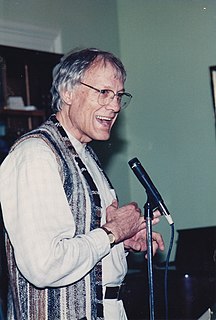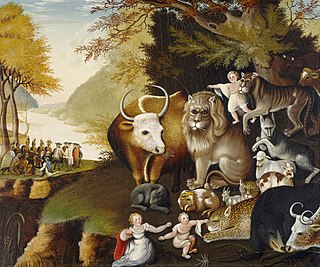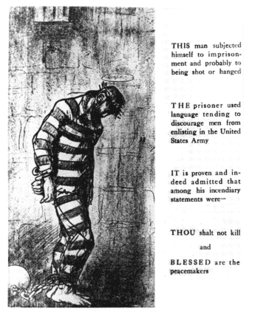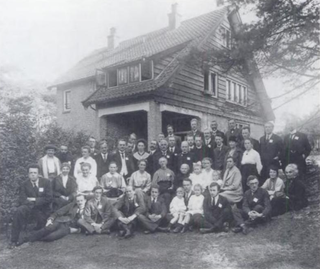
Pacifism is opposition to war, militarism or violence. The word pacifism was coined by the French peace campaigner Émile Arnaud and adopted by other peace activists at the tenth Universal Peace Congress in Glasgow in 1901. A related term is ahimsa, which is a core philosophy in Indian Religions such as Hinduism, Buddhism, and Jainism. While modern connotations are recent, having been explicated since the 19th century, ancient references abound.
The War Resisters League (WRL) is the oldest secular pacifist organization in the United States.

Peace churches are Christian churches, groups or communities advocating Christian pacifism or Biblical nonresistance. The term historic peace churches refers specifically only to three church groups among pacifist churches:
Nonresistance is "the practice or principle of not resisting authority, even when it is unjustly exercised". At its core is discouragement of, even opposition to, physical resistance to an enemy. It is considered as a form of principled nonviolence or pacifism which rejects all physical violence, whether exercised on individual, group, state or international levels. Practitioners of nonresistance may refuse to retaliate against an opponent or offer any form of self-defense. Nonresistance is often associated with particular religious groups.
The International Fellowship of Reconciliation (IFOR) is a non-governmental organization founded in 1914 in response to the horrors of war in Europe. Today IFOR counts 71 branches, groups and affiliates in 48 countries on all continents. IFOR members promote nonviolence, human rights and reconciliation through public education efforts, training programs and campaigns. The IFOR International Secretariat in Utrecht, Netherlands facilitates communication among IFOR members, links branches to capacity building resources, provides training in gender-sensitive nonviolence through the Women Peacemakers Program, and helps coordinate international campaigns, delegations and urgent actions. IFOR has ECOSOC status at the United Nations.

Walter Wink was an American biblical scholar, theologian, and activist who was an important figure in Progressive Christianity. Wink spent much of his career teaching at Auburn Theological Seminary in New York City. He was well known for his advocacy of and work related to nonviolent resistance and his seminal works on "The Powers", Naming the Powers (1984), Unmasking the Powers (1986), Engaging the Powers (1992), When the Powers Fall (1998), and The Powers that Be (1999). He is also known for coining the phrase "the myth of redemptive violence".

Peace testimony, or testimony against war, is a shorthand description of the action generally taken by members of the Religious Society of Friends (Quakers) for peace and against participation in war. Like other Quaker testimonies, it is not a "belief", but a description of committed actions, in this case to promote peace, and refrain from and actively oppose participation in war. Quakers' original refusal to bear arms has been broadened to embrace protests and demonstrations in opposition to government policies of war and confrontations with others who bear arms, whatever the reason, in the support of peace and active nonviolence. Because of this core testimony, the Religious Society of Friends is considered one of the traditional peace churches.

Pax Christi International is an international Catholic peace movement. The Pax Christi International website declares its mission is "to transform a world shaken by violence, terrorism, deepening inequalities, and global insecurity."

John Dear is an American Catholic priest, Christian pacifist, vegetarianism advocate, author and lecturer, and a former member of the Society of Jesus. He has been arrested over 75 times in acts of nonviolent civil disobedience against war, injustice and nuclear weapons as part of his "consistent ethic of nonviolence".

Christian pacifism is the theological and ethical position according to which pacifism and non-violence have both a scriptural and rational basis for Christians, and affirms that any form of violence is incompatible with the Christian faith. Christian pacifists state that Jesus himself was a pacifist who taught and practiced pacifism and that his followers must do likewise. Notable Christian pacifists include Martin Luther King Jr., Leo Tolstoy, Adin Ballou and Ammon Hennacy. Ballou and Hennacy believed that adherence to Christianity required not just pacifism but, because governments inevitably threatened or used force to resolve conflicts, anarchism. However, most Christian pacifists, including the peace churches, Christian Peacemaker Teams, and individuals such as John Howard Yoder, make no claim to be anarchists.
Hildegard Goss-Mayr is an Austrian nonviolent activist and Christian theologian.
John Nevin Sayre was an American Episcopal priest, peace activist, and author. He was an active member of the Fellowship of Reconciliation (FOR) and helped found the Episcopal Pacifist Fellowship. The US State Department official Francis Bowes Sayre Sr. was his brother.
The Anglican Pacifist Fellowship (APF) is a body of people within the Anglican Communion who reject war as a means of solving international disputes, and believe that peace and justice should be sought through non-violent means.

Charles Coates "Charlie" Walker was an American Quaker activist and trainer for nonviolent direct action in both the civil rights and peace movements. He worked throughout his life to bring segregation, racial injustice, nuclear and biological weapons, and war to public awareness. He used Gandhian methods of nonviolence, writing training materials and organizing marches, vigils, protest demonstrations, conferences and campaigns in different parts of the world.
United States Fellowship of Reconciliation was founded in 1915 by sixty-eight pacifists, including A. J. Muste, Jane Addams and Bishop Paul Jones, and claims to be the "largest, oldest interfaith peace and justice organization in the United States." Norman Thomas, at first skeptical of its program, joined in 1916 and would become the group's president. Its programs and projects involve domestic as well as international issues, and generally emphasize nonviolent alternatives to conflict and the rights of conscience. Unlike the U.K. movements, it is an interfaith body, though its historic roots are in Christianity.

Henry Hodgkin (1877-1933) was a medical doctor and a British Quaker missionary who, in the course of his 55-year life, co-founded the West China Union University in Chengdu, co-founded and led the first Christian pacifist movement, the International Fellowship of Reconciliation, and founded the Pendle Hill Quaker meeting and training center, in Wallingford, Pennsylvania.
Lilian Sinclair Stevenson was a Christian peace activist, historiographer and one of the founders of the International Fellowship of Reconciliation.

The Bilthoven Meetings were a series of networking and capacity building meetings of pacifist activists after World War I in the town of Bilthoven in the Netherlands. The activists gathered under the name of Movement Towards a Christian International, which was later renamed to International Fellowship of Reconciliation. The meetings took place at the house of Kees Boeke, a Quaker missionary and pacifist.